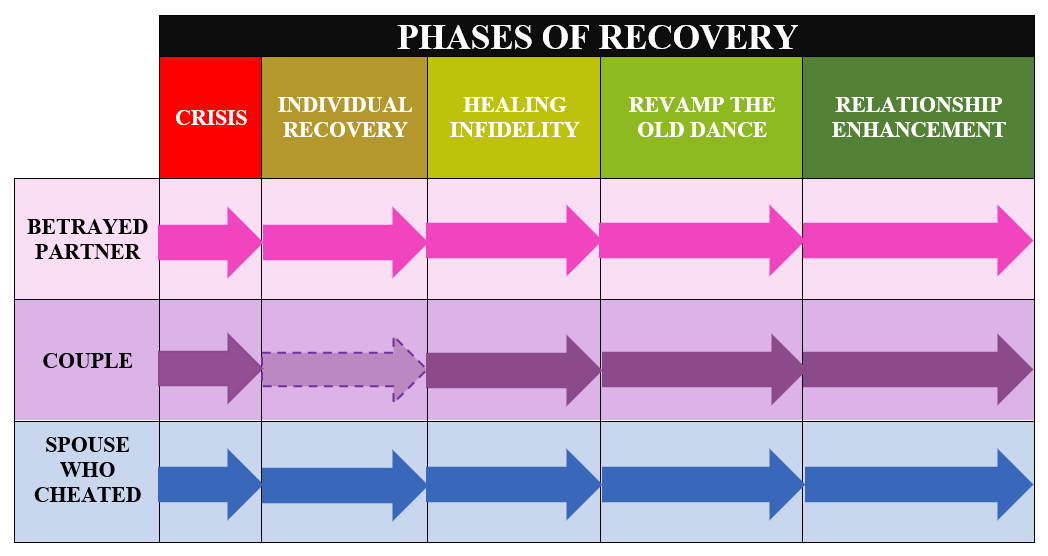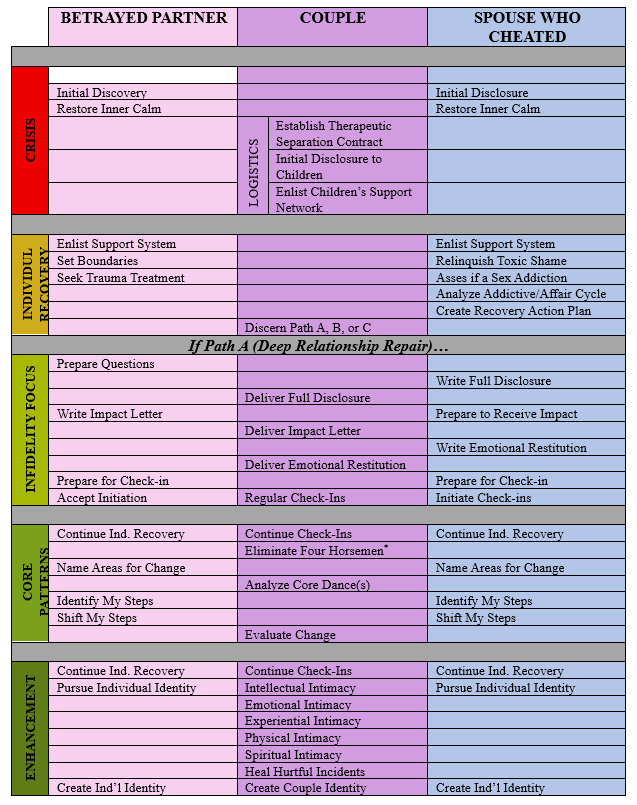CORE TASKS OF INDIVIDUAL AND COUPLE RECOVERY
BOTH THE SPOUSE WHO COMMITTED THE INFIDELITY AND THE BETRAYED PARTNER HAVE AN ENORMOUS AMOUNT OF INDIVIDUAL AND COUPLE WORK TO DO.
In the novel BEYOND PISD, Meg (the betrayed partner who was traumatized) and Art (the addict who committed the infidelities) work through a long and convoluted process of recovering from years of infidelity and sex addiction. Along the way, they met people who supported them, challenged them, and gave them hope.
At every phase of individual and couple recovery, Meg and Art learned essential truths about life, love, and healing. Though they each resisted doing the work at several points along the way, they eventually took on the essential tasks of recovery that facilitated healing for the Meg (the betrayed partner), for Art (the addict), and for the two of them as a couple.
For healing and reconciliation to occur, both the spouse who committed the infidelity and the betrayed partner have an enormous amount of individual and couple work to do. Reducing these recovery tasks to a sequential set of steps oversimplifies the process and creates a paradox.
On the one hand, having a roadmap gives a sense of direction and hope. On the other hand, it is overwhelming to contemplate the enormity of the work ahead and the length of time it will take to work it all through.
When infidelity occurs, there are no guarantees. It takes two to make a marriage, but only one to end it. At any point, either can decide to end the relationship.
If you are recovering from infidelity, Meg and Art Graham’s outcome may or may not be your outcome. As you read and reflect on "BEYOND PISD, you will hopefully:
- feel less alone,
- have your feelings validated,
- gain clarity about things that previously baffled you, and
- be inspired to embrace recovery whether individually or as part of a couple.
Discovery or disclosure of infidelity is a life changing experience. In an instant, innocence and trust are shattered. While the pain is incredible, be assured: recovery from infidelity is possible.
Healing from infidelity is a complex process that, even with the best of help, takes hard work and years to accomplish. While healing the marriage relationship and transforming it into a rich, meaningful, intimate partnership is entirely achievable. That said, even when couples recover from infidelity, betrayed partners live forever with the knowledge that their spouses have the capacity to cheat, come home, look them in the eye, and lie about it. This is the new normal. Most estimates of the time from discovery to settling comfortable into the new normal is between three and five years.
As you progress through recovery from infidelity, you will experience several phases. Each phase in the recovery process has a number of specific tasks. Some of these tasks belong to the betrayed partner, some belong exclusively to the remorseful spouse, and still others require the couple to work together. Very few of these tasks are one-and-done; most tasks become part of an ongoing cycle of healing and relationship repair.
CRISIS PHASE: Whether you are the betrayed partner or the spouse who committed the infidelity, it is important to pause, step away from the situation, and find enough calm to just make it through the next few steps. When you are each able to maintain a degree of composure so you can have a civil conversation, you can come together as a couple to solve some immediate issues such as childcare that require cooperation and collaboration. You need to find the strength and the grace to work these through together before you can begin the healing process.
INDIVIDUAL RECOVERY PHASE: With the immediate issues settled temporarily, you each need to take time to focus on your own recovery journeys. During this phase, couple relationship repair is not the focus.
While you need to continue to be united in ensuring that your children’s needs are met, it is often best to interact with each other as a couple very little during this time, and usually only on a need-to basis.
HEALING INFIDELITY PHASE: Whether you are the betrayed partner or the spouse who committed the infidelity, having the basics of individual recovery in place is essential for you to explore the viability of the marriage. If you decide to work towards healing from the infidelity, it is important for both of you to continue in your own individual recovery processes.
In truth, the work of healing from the infidelity is rarely fully accomplished. Both of you, the betrayed partner and the remorseful spouse, will learn to accept the inevitable flashbacks and triggers that will present themselves. Life as you knew it has been changed forevers, and you will need to address the lingering issues created by the infidelity for years to come.
REVAMP THE OLD DANCE: No relationship is perfect. Over time, you no doubt developed repetitive patterns that detracted from the quality of your relationship. After you address the harm caused by the infidelity, it will be important to learn new ways of being in the marriage. This requires both of you to monitor your thoughts, feelings, and behaviours, and at the earliest steps when old dysfunctional dance patterns emerge, to pause and change your old response patterns. While exploring these new ways of being in the relationship, both of you, the betrayed partner and the remorseful spouse, will continue to work your individual recovery programs.
RELATIONSHIP ENHANCEMENT: With individual recovery firmly in place, the major damage caused by the infidelity repaired, and old dysfunctional patterns replaced, you will ideally seek out and explore new ways to keep your relationship vibrant. With multiple dimensions of intimacy embraced, most couples say that their marriage is more loving and rewarding than they ever imagined possible. As each of you continue in the habits learned as part of your individual recovery work, the focus often shifts at this point. While your involvement in those individual programs diminishes, you both will continue to protect your relationship from the pain of repeating the intimate betrayal trauma.
YOUR MARRIAGE CAN BE MORE LOVING AND REWARDING THAN YOU EVER IMAGINED POSSIBLE!
OVERVIEW OF RECOVERY TASKS
Recovery from infidelity involves grieving, forgiveness, and creating a new vision for life. As you work through each phase of recovery, there are tasks for the betrayed partner, the addicted spouse, and for the couple to take on together. Like grief and forgiveness, recovery is a process, not an event.
Immediately after discovery or disclosure of the infidelity, contemplating all the tasks in the road ahead can be overwhelming. The table below lists the tasks. Rather than focusing on all that lies ahead of you, take encouragement from the knowledge that there are things that you can do individually and as a couple to facilitate your recovery.
LET’S BEGIN THE HEALING PROCESS
FOR THE BETRAYED PARTNER
- Individual Recovery for the Betrayed Partner
- Partner Trauma Model
- Betrayed Partner Crime Sheet
- Betrayed Partner: Forgive
FOR THE ADDICTED SPOUSE
FOR THE COUPLE
GENERAL QUESTIONS
The recovery process begins with essential couple tasks and then quickly shifts to individual tasks that the betrayed partner & the spouse who committed the infidelity work on separately. During the remainder of the recovery process, there continue to be individual tasks as well as couple tasks.
- What are the advantages and dangers in separating and taking a break from couple work to focus on individual recovery?
- What are the challenges in the recovery process that takes three to five years?
BIBLIOTHERAPY QUESTIONS
For Both The Betrayed Partner and The Spouse Who Committed the Infidelity
- What are the similarities and differences between your experience and the sequence of recovery phases and tasks described here?
- Where do you see yourself as an individual and you and your spouse as a couple on the road to recovery?
- If you are at the beginning of your recovery, what are your thoughts and feelings as you contemplate the long road of recovery ahead of you?
- If you are further along in your recovery, what pieces of the recovery process did you and your spouse do well? What tasks were omitted? What tasks would you like to revisit?
- In your experience, what changes would you make to the recovery process sequence and tasks?



